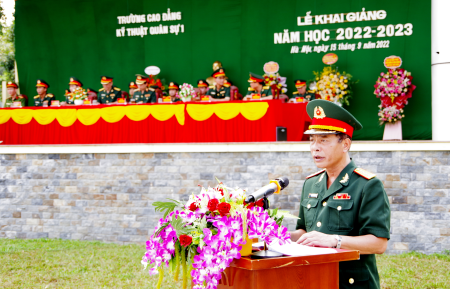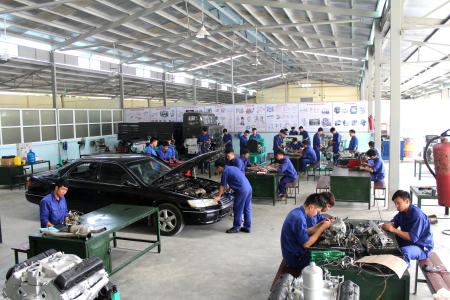Military Technical College 1 proactively overcomes difficulties to successfully fulfil its tasks
Military Technical College 1 (under the General Department of Technology) is responsible for training cadets into technical staff with Associate’s Degree, Intermediate Degree, and Elementary Degree in Weaponry, Vehicle – Machinery, and Mechanics; it is also tasked with organising driving courses or training courses for technical cadres and employees. Due to its diverse functions and tasks, a wide variety of educational levels, and diverse groups of learners, the College has been confronted with difficulties in education and training, particularly in the development of school curricula, teaching staff, training materials, and facilities. Meanwhile, since the merger, there have been changes in the College’s organisational structure; the College is stationed in one province and one municipality; its facilities and technical equipment have been in use for ages, thereby facing deterioration; its cadres, instructors, employees, and soldiers are encountering a lot of difficulties in their daily life. Against that backdrop, the College’s Party Committee and Board of Directors have drastically, synchronously adopted measures to bring into play the synergy created by all forces, overcome hardships, and successfully fulfil all tasks.
 |
| Sr. Col. Nguyen The Dung delivers the speech on the launch of the 2022-2023 academic year |
First of all, focusing on consolidating the College’s organisational structure and building an “adept, compact, flexible, efficient” contingent of cadres and instructors. Grasping and realising higher echelons’ resolutions, directives, and plans, the College’s Party Committee and Board of Directors have developed a specialised Resolution on merger and plans on receiving and handing over personnel, facilities, weapons, and technical equipment, together with specific measures and road maps for each phase. The College’s Party Committee has directed its affiliated party committees and organisations to regularly carry out the work of political and ideological education for cadres, instructors, employees, cadets, and soldiers, particularly those from offices and units that would be merged with one another. Those party committees and organisations have been required to receive all feedback, grasp troops’ ideology and desires, and anticipate situations in the merger process so as to avoid negative effects on their task performance. Besides, due attention has been paid to proactively detecting and resolutely fighting against misconceptions, wrongdoings, and destructive speeches. Hence, a consensus about merger and a sense of unity have been formed within offices and units of the College.
In addition to consolidating its organisational structure, the College has proactively directed its affiliates to review plans on training, retraining, and using cadres and instructors in line with the Project on “Building a contingent of instructors and educational managers within the Military to meet the requirements set by the fundamental, comprehensive reform in military education and training in the period of 2023 – 2030”. In this regard, significance has been attached to taking staff’s age, educational background, capability, and experience into consideration for appointment to each position. To satisfy the requirements of development in the new period, the College has combined forms of training and retraining and attached importance to deploying its cadres to other units across the Military to improve their professional competence and hands-on experience. Thanks to various synchronous measures, in a short period of time, the College’s organisational structure has been stabilised; the College’s offices, committees, and battalions have smoothly collaborated with one another in performing all tasks.
 |
| Practice time of cadets majored in military vehicle |
Second, raising the quality of directing, managing, commanding, and operating work in a “focalised, uniform, synchronous, effective, practical” way, supplementing and completing training curricula in an open, modern fashion. Due to the merge and dispersal of its affiliates, there have been differences in management work and the implementation of tasks, while the system of training materials and programmes has yet to be unified. To opportunely deal with those differences and shortcomings, the College has proactively developed and issued statutes and plans to achieve uniformity in the process of direction, operation, and implementation of tasks. Great value has been attached to closely combining uniform management with decentralisation and promoting the roles of all-level party committees and commands. Emphasis has been placed on applying information technology to managing, commanding, and operating the task performance; the College has realised its direction, command, management, and operation in both direct and online ways via the television network, the military data transmission, and the Intranet.
Under the guidelines by the Central Military Commission and the Ministry of National Defence on renewing education and training to build high-quality human resources for the modernisation of the Military, the College has adhered to directions and guiding documents by the General Department of Technology to focus on developing standard training outcomes for groups of learners. Based on those standards, it has directed its offices and faculties to review all training curricula and request feedback from units across the Military. It has resolutely removed overlapping parts, adjusted, supplemented, gradually standardised, and modernised its training curricula as well as ensured the inter-connectivity between educational levels. In addition, significance has been attached to providing specialised training, reducing theoretical parts, and increasing practice in accordance with each group of learners, technical work in the new situation, and units’ practical conditions. In the school year of 2022 – 2023, the College managed to formulate 17 standard training curricula for Associate’s Degree and Intermediate Degree, while reviewing, adjusting, and updating 7 training curricula of different degrees.
Third, actively applying learner-centred methodology, “situation-based training and state-based repair”. To improve cadets’ craftsmanship, skills in dealing with practical situations, and professionalism, the College has directed its faculties to employ learner-centred methodology, give instructions to cadets on studying documents, collecting information, designing debate outlines, conducting group analyses, and working on assignments, encourage cadets’ creativity, and better cadets’ self-study capacity and skills in group work. The College has spent most of the duration of its curricula on practice, flexibly organised exercises for cadets in accordance with its existing technical equipment, proactively closely cooperated with units and factories so that cadets could practise on new technical equipment and have a chance to make a comparison between theory and practice, improve their knowledge and skills, and rapidly, correctly deal with situations. Besides, the College has directed its offices and faculties to raise the quality of testing and educational assessment, develop and seriously manage banks of examination questions, frequently maintain class inspections, well exercise democracy in training, and increase regular and irregular inspections to guarantee objectivity, honesty, and standard outcomes in education and training.
Fourth, actively giving advice on mobilising investments for facilities and equipment on a standardised, modernised, focalised basis in accordance with the Military’s development. Under the motto “schools’ training quality is units’ combat readiness capability”, in order to handle weaknesses in weapons and technical equipment for training, the College has adhered to directions of the General Department of Technology, especially the guidelines on developing weapons and technical equipment within the Military. Besides, correctly assessing the status of its facilities and equipment, the College has directed its offices to devise projects, programmes, and plans on providing equipment for training; it has actively mobilised resources to modernise facilities, equipment, means, and training grounds, thereby meeting its long-term and short-term task requirements. Emphasis has been placed on consolidating and upgrading information technology infrastructure, developing a military data transmission network across all offices and units, and acquiring pieces of software for management, command, operation, teaching as well as pieces of new-generation simulation software to raise the quality of training. The College has also digitalised its training materials and proactively collaborated with factories and research centres in holding training courses for its instructors on gathering and designing training materials. Currently, the College is consolidating and effectively using a firing tunnel for infantry guns testing, focusing resources on modernising its Driving Test Centre into the Northern Driving Test Centre under directions given by the Ministry of National Defence and the General Department of Technology. Moreover, the College has developed and released a lot of mechanisms and policies to encourage its cadres, instructors, and employees’ participation in scientific research for education and training to keep pace with the development of modern technology. Since 2022, the College has engaged in 34 technical initiatives and innovations, carried out 7 scientific research works, and designed 21 training materials; it won the second prize in the Contest on initiatives and innovations for training equipment held by the General Department of Technology.
With its great political determination and drastic, synchronous measures, the College has step by step surmounted difficulties to successfully fulfil all assigned tasks. In the school year of 2022 – 2023, the College was presented with a Certificate of Merit by Chief of General Staff; it completed all training and retraining programmes for groups of learners. More importantly, the College successfully hosted the Military-wide Driving Contest in 2023, which was highly appreciated by the Ministry of National Defence and the General Department of Technology. All those accomplishments will lay an important foundation for Military Technical College 1 to keep improving its task performance, deserve to be a top training centre of the Military for Weaponry and Vehicle – Machinery, and satisfy its task requirements in the new situation.
Sr. Col. NGUYEN THE DUNG, Rector of the College